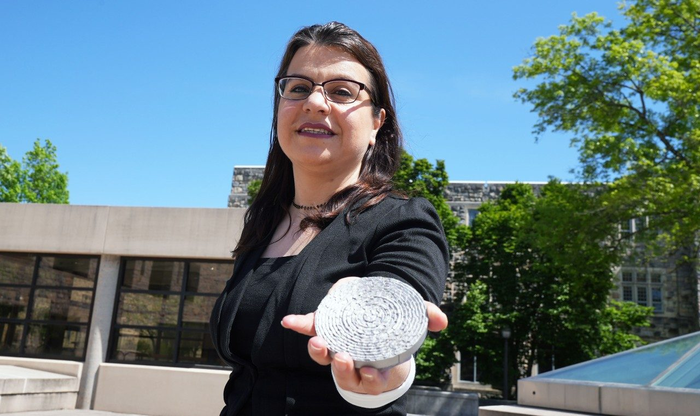Shima Shahab, assistant professor in the Department of Mechanical Engineering, has been awarded a National Science Foundation Faculty Early Career Development (CAREER) award to develop innovative methods for delivering ultrasound treatments.

Credit: Virginia Tech
Shima Shahab, assistant professor in the Department of Mechanical Engineering, has been awarded a National Science Foundation Faculty Early Career Development (CAREER) award to develop innovative methods for delivering ultrasound treatments.
Anyone who has stood near a loudspeaker at a concert has felt the energy that can be delivered through sound waves. Heavy bass at a concert can feel like a physical impact. This principle underscores the technology of focused ultrasound, which harnesses that kind of energy to deliver concentrated energy waves in specific locations. Those waves can pass through body tissues, which makes them well-suited for use in noninvasive medical treatments.
Shahab’s lab explores new ways to direct that energy using acoustic lenses. Just as an optical lens can focus light beams on a single point, acoustic lenses manipulate sound energy. This development takes the capability of ultrasound to another level. Depending on the configuration of a lens surface, sound waves can be redirected and delivered with surgical accuracy.
The team has worked to develop this approach as an effective tool for treating issues within the brain, tackling problems such as noninvasive brain tumor ablation and transient blood-brain barrier disruption. If the technology can be improved enough, it would open the door for treatments of brain tumors, epilepsy, and Alzheimer’s and Parkinson’s diseases.
“With the advent of mathematical models in this project, new acoustic lenses have a great potential to be a groundbreaking technology for generating arbitrary high-intensity focused ultrasound fields used in ultrasound therapies,” said Shahab. “To this end, we will collaborate with the Department of Biomedical Engineering and Mechanics and Fralin Biomedical Research Institute at VTC to improve the quality of life for patients with brain disease by minimizing their treatment time.”
Shahab’s CAREER award will provide funding to advance these state-of-the-art treatments. Lenses will be 3D-printed for each specific patient to produce sound waves that are matched exactly to what they’re treating. To create the highest level of lens customization, a wide range of data will be gathered, including variations on texture and thickness of the acoustic lens and feedback about different tissues respond. By pairing biological data with the creation of custom treatments, Shahab and her team will be able to offer a valuable set of tools to the scientific community that enable new possibilities for a patient’s health and well-being.
Their research has been published in Applied Physics Letters and AIP Scilight.
Along with the research activities, the team will use the funding to offer activities centered on ultrasound haptics using acoustic lenses at summer camps for underrepresented students from historically black colleges and universities. The camps will be held in collaboration with the Center for the Enhancement of Engineering Diversity and the Office of Undergraduate Research. Participants will acquire unique skills, build professional networks, and gain cross-cultural experiences.
In further educational outreach, Shahab will team up with educators from the Science Museum of Western Virginia and Virginia Tech’s Science Festival with up to 6,000 participants, including K-12 students, to create age-appropriate, educational, hands-on activities about acoustic holograms. The project aims to increase science, technology, engineering, and mathematics career awareness through two-way interactions between young learners and real scientists. Shahab also will work with the Center for Educational Networks and Impacts to design and implement a comprehensive evaluation to assess the broader impacts of this project.



